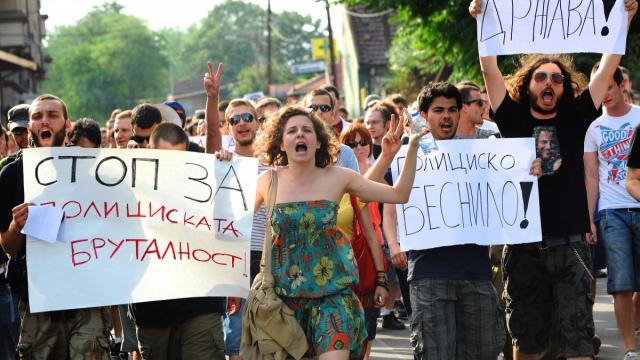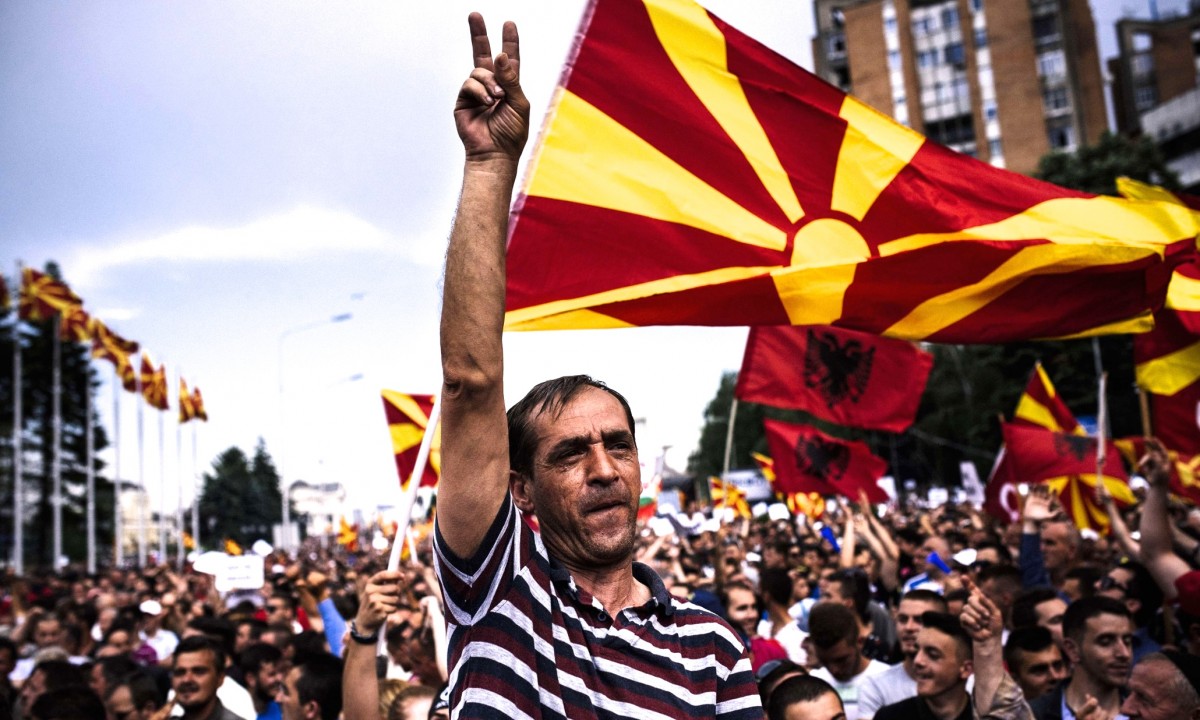
Around 20,000 demonstrators have taken to the streets in Macedonia to call for the government to stand down, a week after 18 people died in a bloody gun battle between ethnic Albanian guerrillas and police.
The Balkan country has been thrown into a political crisis in recent months, with the government allegedly implicated in a massive wire-tapping scandal and of rigging elections, while the opposition leader has been accused of plotting a coup.
Thousands of people gathered outside the government headquarters waving both Macedonian and Albanian flags to demand that the embattled conservative prime minister, Nikola Gruevski, resign.
The international community has grown increasingly concerned about Macedonia as the opposition has released recordings that allegedly show Gruevski and other senior government officials conspiring to undermine the independent media, compromise the judiciary, and rig elections.
The government has said that the tapes are doctored and accused opposition leader Zoran Zaev of the ex-communist Social Democrats (SDSM) of plotting to take power by non-democratic means.
Macedonia’s crisis escalated on May 9 and 10, when the police engaged ethnic Albanian fighters, some from neighboring Kosovo, in a fierce gun battle in the city of Kumanovo. The incident raised fears of renewed ethnic conflict; in 2001 Macedonia fought a brief war with Albanian insurgents, which was preceded by a wire-tapping scandal implicating the government. Around 25% of Macedonia’s population is ethnic-Albanian.
“These are anti-government protests of the citizens, peaceful protests with the main goal of the resignation of the prime minister and government,” said Andrej Petrov, an opposition MP, speaking from the demonstration in Skopje. “The aim is democracy and freedom in the country. It’s in all our interests to live in a normal country.”
Zaev has demanded a government of national unity, which has been resisted by Gruevski, prime minister since 2006, who has enjoyed repeated election victories. A raft of senior ministers resigned on 13 May, as well as the head of security services heavily implicated in the wire-tapping scandal and also Gruevski’s cousin. But this has failed to cool opposition anger.
The E.U. is currently brokering talks between the government and opposition, while Russia has thrown its weight behind Gruevski. Macedonia is a candidate for EU membership, but negotiations on its accession have been frozen due to a dispute with Greece over the country’s name.
Ivo Vajgl, the E.U. rapporteur on Macedonia, told the Guardian that there was a serious risk of further escalation that could suck in other countries in the region: historically Serbia and Bulgaria have vied for influence in Macedonia. He added that he suspected Islamic militants were behind the Kumanovo incident.
“I fear there is potential for a regional security crisis, and many countries being involved,” Vajgl said. “This group from Kumanovo has shown that there is very poor control of the groups who come in the region with clear intention of destabilising countries, or promoting ideologies which are unacceptable for us.”
Government supporters are planning a counter-demonstration on Monday. Cvetin Chilimanov, a conservative commentator, said that the government still enjoys broad support and criticised Zaev for destabilising the country and raising ethnic tensions.
“We will need to resolve this through the institutions, and not through the streets,” he said. “Macedonian voters who will be asking the opposition, we had a growing economy, no ethnic tensions before your wiretapping campaign. It wasn’t broken: why the hell were you trying to fix it?”
3 WAYS TO SHOW YOUR SUPPORT
- Log in to post comments












